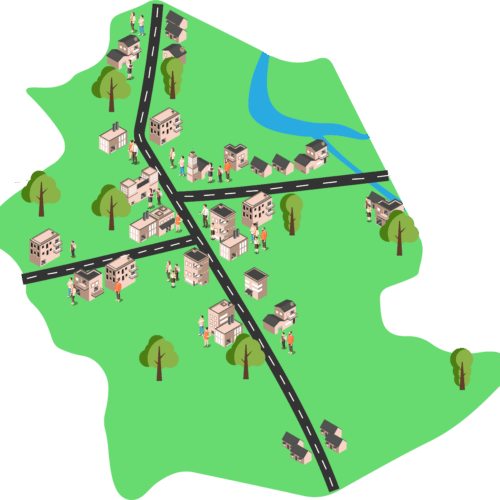

HISTORY OF MANGALDAN:
The oldest municipality of the Fourth District of Pangasinan, having been founded in June 1600, Mangaldan sits boldly and beautifully nestled between two seaside towns. With its modernized public plaza, a well-preserved Santo Tomas de Aquinas Church, a shopping mall, and various restaurants scattered within the city proper, the municipality of Mangaldan serves as the transitory area between urbanized Dagupan and rural San Fabian.
Mangaldan folklore has conjured three diverse and equally exciting stories on where the town’s name originated. One version goes back to the hispanic colonial era when a Spanish missionary first set foot in the area and asked a resident for water, to which the resident replied, “manga-alay-adan” (which directly translates to “Adan is fetching water”). Another version of its etymology roots to the first native ruler in the area named “Babaldan.” The last version narrates the story of a huge mango tree in the center of the plaza, where folks would be free to get what they need. However, when other residents were taking more than what they needed, leaving others with little to no fruits to spare, the situation caused frequent quarreling among the townspeople, which was dubbed “man-nga-ngal-ngalan,” which means quarreling in Pangasinan.
Since the town has little to no geographical variations, the plains and rivers are the townspeople’s primary sources of food and income. Their central economic resource is livestock, where they obtain raw pork, beef, and carabao meat, also known as pindang. The pindang is also a cultural symbol for the municipality of Mangaldan as they celebrate the Pindang festival every first week of March. The Municipality of Mangaldan is also famous for delicacies such as tupig, bibingka, and other native cakes, and condiments like bagoong (fish paste) and patis (fish sauce).
Today, Mangaldan is a first-class municipality spanning about 4,847 hectares of land area, shared by thirty distinct barangays, and housing 106,331 people.
Mangaldan

HISTORY OF MANGALDAN:
The oldest municipality of the Fourth District of Pangasinan, having been founded in June 1600, Mangaldan sits boldly and beautifully nestled between two seaside towns. With its modernized public plaza, a well-preserved Santo Tomas de Aquinas Church, a shopping mall, and various restaurants scattered within the city proper, the municipality of Mangaldan serves as the transitory area between urbanized Dagupan and rural San Fabian.
Mangaldan folklore has conjured three diverse and equally exciting stories on where the town’s name originated. One version goes back to the hispanic colonial era when a Spanish missionary first set foot in the area and asked a resident for water, to which the resident replied, “manga-alay-adan” (which directly translates to “Adan is fetching water”). Another version of its etymology roots to the first native ruler in the area named “Babaldan.” The last version narrates the story of a huge mango tree in the center of the plaza, where folks would be free to get what they need. However, when other residents were taking more than what they needed, leaving others with little to no fruits to spare, the situation caused frequent quarreling among the townspeople, which was dubbed “man-nga-ngal-ngalan,” which means quarreling in Pangasinan.
Since the town has little to no geographical variations, the plains and rivers are the townspeople’s primary sources of food and income. Their central economic resource is livestock, where they obtain raw pork, beef, and carabao meat, also known as pindang. The pindang is also a cultural symbol for the municipality of Mangaldan as they celebrate the Pindang festival every first week of March. The Municipality of Mangaldan is also famous for delicacies such as tupig, bibingka, and other native cakes, and condiments like bagoong (fish paste) and patis (fish sauce).
Today, Mangaldan is a first-class municipality spanning about 4,847 hectares of land area, shared by thirty distinct barangays, and housing 106,331 people.
How To Get Here:
- Mangaldan - San Jacinto Road
- San Fabian - Pangasinan - La Union Road
- Santa Barbara - Mangaldan Road
- Dagupan - Binalonan - Dagupan Highway
Artist from Mangaldan
Businesses From Mangaldan
EVENTS
Who
What
Who
What
There are no upcoming events.
April 2024 |
||||||
|---|---|---|---|---|---|---|
| Mon | Tue | Wed | Thu | Fri | Sat | Sun |
|
1
|
2
|
3
|
4
|
5
|
6
|
7
|
|
8
|
9
|
10
|
11
|
12
|
13
|
14
|
|
15
|
16
|
17
|
18
|
19
|
20
|
21
|
|
22
|
23
|
24
|
25
|
26
|
27
|
28
|
|
29
|
30
|
|||||